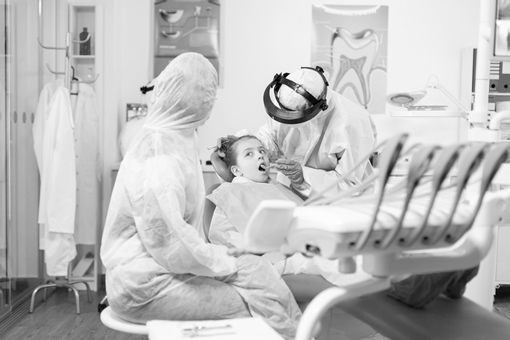Surgical dental treatments in Dombivli and Palava City
Dr. Tejal Thorve and her team of Oral Surgeons at Care and Cure Dental Clinic possess the necessary expertise, training, and state-of-the-art equipment to handle a wide range of oral surgical procedures. Patients can trust in their skills and experience, knowing that they will receive the highest quality care throughout their surgical journey. Click here to get the direction of the oral surgeon clinic near you.

What Exactly Is
Surgical Dental Treatment?
Surgical dental treatments refer to dental procedures that involve invasive techniques to address complex oral health issues. These procedures are typically performed by oral surgeons, who are specialists in oral and maxillofacial surgery.
Other Dental Services
There are various reasons why someone may require oral surgical treatment. Here are some common reasons:
- Wisdom Tooth Extraction: At Care and Cure Dental Clinic, we offer efficient wisdom tooth extraction procedures. Our experienced Oral Surgeons use advanced techniques to safely remove impacted or problematic wisdom teeth. Our clinic is equipped with state-of-the-art dental instruments ensuring a comfortable and pain-free experience for our patients.
- Dental Implant Placement: Care and Cure Dental Clinic specializes in dental implant surgeries. Our skilled team of dentists utilizes cutting-edge technology to precisely place dental implants, providing patients with a natural-looking and durable solution for missing teeth. Our clinic features modern diagnostic tools and implant surgical kits, guaranteeing optimal results and patient satisfaction.
- Periodontal Surgery: Care and Cure Dental Clinic offers effective periodontal surgeries to treat various gum diseases. Our dental specialists employ advanced techniques such as flap surgery, gum grafting, and guided tissue regeneration to restore gum health. Our clinic is equipped with state-of-the-art Radiocautery technology and surgical instruments, enabling us to deliver optimal results in periodontal care.
- Orthognathic Surgery: At Care and Cure Dental Clinic, we provide orthognathic surgeries to correct jaw and facial irregularities. Our skilled oral and maxillofacial surgeons perform procedures like jaw repositioning and corrective jaw surgery.
- Tooth Extraction: When tooth extraction is necessary, Care and Cure Dental Clinic ensures a safe and comfortable experience. Dr.Tejal Thorve employsmodern techniques, including minimally invasive extraction methods. We have specialized extraction instruments and a dedicated sterilization area to maintain a sterile environment for the procedure.
Are you looking for best dentist in Dombivli?
At Care and Cure Dental Clinic, oral surgical treatments are performed by qualified professionals, such as oral and maxillofacial surgeons or periodontists, who have received specialized training in this field. If you have specific concerns or require oral surgical treatment, you can consult with Dr Tejal thorve and team for a comprehensive evaluation and personalized advice.
Frequently Ask Questions
Q: What is oral surgical treatment?
Oral surgical treatment involves procedures performed by oral and maxillofacial surgeons to address various conditions and diseases related to the mouth, jaw, and facial structures. These procedures can include tooth extractions, dental implant placement, corrective jaw surgery, treatment of oral infections, and more.
Q: Do oral surgical procedures hurt?
During oral surgical procedures, local anesthesia is typically used to numb the area being treated. This helps minimize any pain or discomfort during the procedure. In some cases, sedation or general anesthesia may also be used to ensure the patient’s comfort.
Q: How long does it take to recover from oral surgery?
Recovery times can vary depending on the specific procedure and individual factors. Generally, it takes a few days to a couple of weeks to recover fully. Your oral surgeon will provide you with detailed post-operative instructions and guidelines to follow for a smooth recovery.
Q: Are there any risks associated with oral surgery?
Like any surgical procedure, there are potential risks associated with oral surgery. These risks can include infection, bleeding, nerve damage, dry socket (after tooth extraction), and adverse reactions to anesthesia. However, oral surgeons are trained professionals who take precautions to minimize these risks and ensure patient safety.
Q: How can I prepare for oral surgery?
Your oral surgeon will provide you with specific pre-operative instructions tailored to your procedure. Generally, you may be advised to avoid eating or drinking for a certain period before the surgery, arrange for transportation to and from the surgery center, and follow any medication or fasting guidelines provided.
Q: What can I eat after oral surgery?
Following oral surgery, it’s common to have a soft diet for a few days to allow for proper healing. This can include foods like soups, smoothies, mashed potatoes, yogurt, scrambled eggs, and soft fruits. Avoid hard, chewy, or spicy foods that could irritate the surgical site.
Q: How do I manage pain after oral surgery?
Your oral surgeon will likely prescribe pain medications to manage any discomfort after the surgery. Follow the prescribed dosage and schedule. Additionally, applying cold compresses to the outside of the face and gently rinsing with warm saltwater can help alleviate pain and swelling.
Q: Will there be visible scars after oral surgery?
The visibility of scars will depend on the type of oral surgery performed. In many cases, incisions are made inside the mouth, which reduces the visibility of scars. However, for procedures involving incisions on the face or jaw, your oral surgeon will make efforts to minimize scarring and provide appropriate aftercare instructions.

